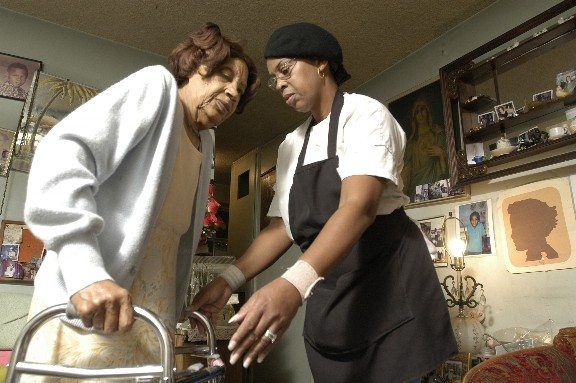
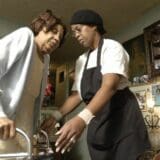
By Michele Reed
I am an in-home care worker and vice president of a union called United Long Term Care Workers (ULTCW), which is a member of the Service Employees International Union. Currently, I and over 120,000 other in-home caregivers are negotiating with Los Angeles County to win a living wage and better future for home-care workers. As testimony to the need for a living wage, here is my story.
Just over 19 years ago, I started taking care of my grandmother. She already had a home-care worker but I would help with errands, help around the house and just thought to myself that after all she had done for me, this was the least I could do for her. From the moment I started taking care of her, I knew that home care was my calling.
Growing up, I was an only child and my mother was an only child too.
» Read more about: A Living Wage: Making a Difference for Caregivers »
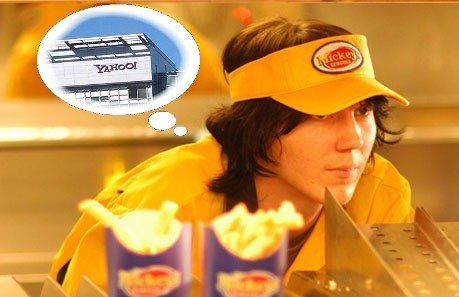

During his 20-year career as a journalist, Rick Wartzman delved deep into the reality of poverty for a major Wall Street Journal examination of the minimum wage and also mastered the intricacies of corporate finance as business editor of the L.A. Times. In yesterday’s interview with Frying Pan News, the executive director of the Drucker Institute discussed the destructive force of big business’ “shareholder-is-all culture.” In today’s conclusion, Wartzman talks about Walmart, the outlook for unions and the need to build an education-based service economy.
Frying Pan News: How would you characterize Walmart, which is now trying to move into L.A.’s grocery market?
Rick Wartzman: Walmart is less Drucker-like than Costco, certainly, but increasingly presents a complicated picture. They’ve always paid lousy wages and benefits, squeezed suppliers until they choked and accelerated the race to the bottom in terms of low-cost labor.
» Read more about: Interview: Rick Wartzman on Greed and Conscious Capitalism, Part 2 »
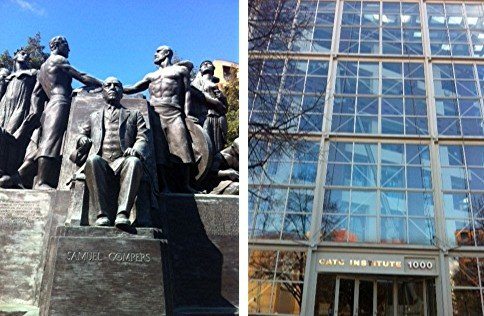
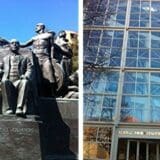
What do 19th century labor leader Samuel Gompers and the virulently anti-union think tank, the Cato Institute, have in common? More than you might imagine. They actually stare out at each other across Massachusetts Avenue in Washington, D.C. Or rather, the beautiful monument of Gompers and Gompers Square sit directly opposite Cato’s towering, modern offices, where the Koch brothers regularly plot strategy.
I discovered this humorous anomaly while moving into my temporary apartment around the corner, on 11th Street and Massachusetts Avenue, as I prepared to begin a three-month fellowship at Georgetown University — and a project that will look at ways to link to federal policy our efforts to build a new economy for all in Los Angeles. More on that later.
In memory of Gompers, I decided to create an imagined dialogue between the Cato Institute — now embroiled in an internal brouhaha involving the Brothers Koch – and their ever present bronze nemesis,


 Few can claim as much knowledge of both sides of America’s polarized wealth divide as Rick Wartzman. During his 20-year career as a journalist, Wartzman delved deep into the reality of poverty for a major Wall Street Journal examination of the minimum wage and also mastered the intricacies of corporate finance as business editor of the L.A. Times. At the Times he also originated one of the paper’s only serious attempts at understanding the real economic challenges of our time, a column that the Times soon jettisoned, making clear that covering the lives of the working class — truck drivers, hotel workers, factory hands — was not a priority.
Few can claim as much knowledge of both sides of America’s polarized wealth divide as Rick Wartzman. During his 20-year career as a journalist, Wartzman delved deep into the reality of poverty for a major Wall Street Journal examination of the minimum wage and also mastered the intricacies of corporate finance as business editor of the L.A. Times. At the Times he also originated one of the paper’s only serious attempts at understanding the real economic challenges of our time, a column that the Times soon jettisoned, making clear that covering the lives of the working class — truck drivers, hotel workers, factory hands — was not a priority.
Since 2007 Wartzman has served as executive director of the Drucker Institute, a think tank founded to perpetuate the legacy of management guru Peter Drucker and dedicated to bettering society by helping organizations to be more effective and responsible.
» Read more about: Drucker Institute’s Rick Wartzman on Greed and Conscious Capitalism »
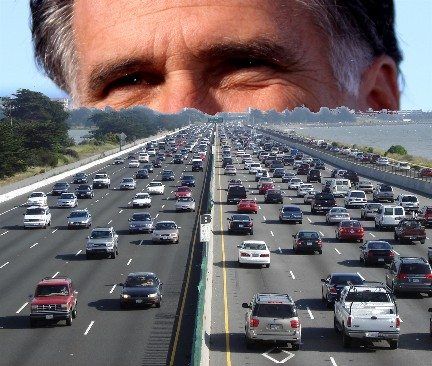

Since when did one’s mode of transportation become about politics? Who ever thought that riding one’s bike to the grocery store, taking the bus to work or driving to run errands could be a sign of one’s political stripes?
In some cities, such as New York and San Francisco, riding the train defines the experience of everyone living there. Entire movies, books and blogs have documented the romance and day-to-day life of riding public transit and navigating busy sidewalks. Can you even imagine what a New York free of subways, buses and pedestrians would look like? Republican or Democrat, liberal or conservative, you’re on the train.
Just ask Mitt.
Mitt Romney is among a vocal set of Republicans who have decided that certain forms of transportation are more democratic than others; he subscribes to the belief that roads are a given right of Americans,
» Read more about: Highway Robbery: Mitt Romney’s War on Mass Transit »


Happy Birthday, Walmart! You great big mega-marketing rascal–you turn 50 this week. You’ve come such a long way from Roger, Arkansas, the tiny town at the foot of the Ozarks where you took your first wobbly steps.
Now you’re an international star! The planet’s biggest private-sector employer, with 2.2 million “associates” throughout the world—we usually call ‘em employees, but whatever– 1.4 million in the United States. Creator of history’s most efficient global supply chain, you call the shots on production, wage and workplace standards around the world—the Walmart business model ruthlessly undercut those everywhere. Plus you have shriveled and destroyed small business communities in towns across the United States.
Star power, dudes.
Now you are here in Los Angeles celebrating the big Five Oh with a new acquisition.
It’s tasteful, not large and gaudy, like your typical 200,000 square foot megastore.
» Read more about: Grand Illusion: Walmart's Birthday "Gift" to Chinatown »


I’m going to hate writing this. Every word.
Last week Masaharu Morimoto of Iron Chef fame was outed by my union, UNITE HERE, Local 11 as being in talks with the Hyatt Andaz hotel to take over the RH restaurant, where I work as a server.
I first became aware of the news when I arrived at a large picket in front of the Hyatt Andaz. The action was two days before Valentine’s Day. I was late to the picket because, as noted in an earlier column, I had to drive my mother-in-law to Walmart — which still pains me to admit.
The action in front of my hotel, like many before, was about protesting current work and safety conditions. It was co-sponsored by OUT and OCCUPY, which is a LGBTQ organization that has been unified with UNITE HERE Local 11 in making sure that all workers,


Frying Pan News writer Donald Cohen appears on television tonight in a segment of KCET’s SoCal Connected to discuss El Segundo’s alleged sweetheart tax deal with the Chevron oil corporation, whose local refinery has long dominated the town’s commerce and politics.
The case became a scandal when El Segundo’s city manager, Doug Willmore, was sacked after he purportedly dug up details of a 1994 agreement between Chevron and city officials that codified the company’s low tax payments in perpetuity.
The Channel 28 program, “Small Town, Big Oil,” airs 9 p.m. Friday, with repeat showings scheduled for the following week . Click here to see entire episode.
» Read more about: Spotlight on El Segundo's Oil-Tax Controversy »

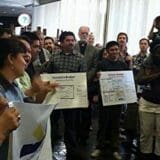
Long Beach hospitality workers are one step closer to better wages. After years of trying to improve conditions in the hotel industry, members of the Long Beach Coalition for Good Jobs and a Healthy Community filed paperwork to place a citywide measure on the November ballot that would require hotels to pay hospitality workers a living wage.
The living wage measure would affect hotels with more than 100 rooms, requiring them to pay workers $13 an hour. Research from past living wage victories in areas such as Los Angeles’ Century Boulevard has estimated that workers reinvest over two-thirds of their increased income back into the local community. Higher hotel wages in Long Beach would not only lift families out of poverty, but would spark a much-needed reinvestment in the city’s local businesses and neighborhoods.
A recent story and video in the Long Beach Press Telegram captures the kickoff to this historic campaign.


If you’re a woman, an artist, a cancer survivor or patient; someone with a connection to the Holocaust or the 1960s women’s movement — in fact, if you’re anyone who wonders how we human beings can endure indescribable suffering and come out the other end with something to say about it – you must see Alina Szapocznikow, Sculpture Undone at the Hammer museum before it closes April 30th. I fit a number of those categories and was deeply moved to find such connections with the work.
At the beginning of the exhibit you meet the artist (who died in 1973 at the age of 47) in a rough video. She’s young and lively and seems so innocent. When the thick-headed interviewer asks about her experiences as a young girl in a Nazi concentration camp, Szapocznikow responds with “it would be immodest to discuss my own suffering.” When the same off-screen voice asks her to describe what it’s like to be a woman in 1960s Poland,
» Read more about: The Body Reconsidered: The Art of Alina Szapocznikow »